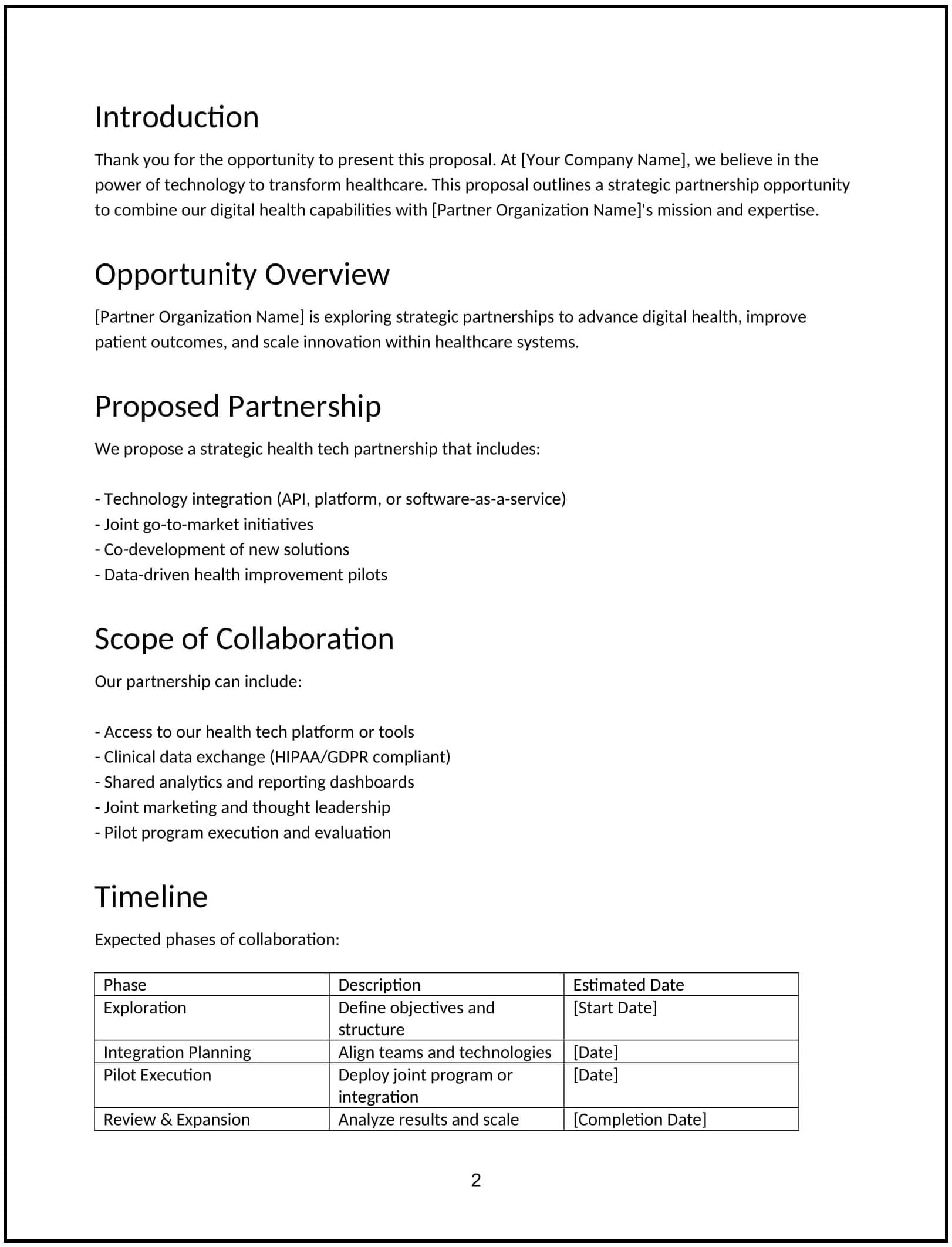Got contracts to review? While you're here for proposals, let Cobrief make contract review effortless—start your free review now.

Customize this template for free
Customize this free health tech partnership proposal with Cobrief
Open this free health tech partnership proposal in Cobrief and start editing it instantly using AI. You can adjust the tone, structure, and content based on the type of organization, integration needs, and mutual goals. You can also use AI to review your draft — spot gaps, tighten language, and improve clarity before sending.
Once you're done, send, download, or save the proposal in one click — no formatting or setup required.
This template is fully customizable and built for real-world use — ideal for strategic partnerships between digital health startups, hospitals, payers, wellness platforms, or enterprise clients. Whether you’re proposing a pilot, co-branded product, or data integration, this version gives you a structured head start and removes the guesswork.
What is a health tech partnership proposal?
A health tech partnership proposal outlines a formal opportunity for collaboration between a healthcare-focused technology company and another organization — such as a provider network, employer, insurer, or platform. It covers shared goals, roles, benefits, implementation timelines, and business terms.
These proposals help both sides align before committing time and resources.
A health tech partnership proposal helps:
- Define what’s being proposed, why it matters, and how it will work
- Clarify technical and operational responsibilities
- Align incentives, timelines, and support expectations
- Build credibility with structure and professionalism
If you're exploring a strategic collaboration in digital health, this proposal structure gives you a clean way to start.
Why use Cobrief to edit your proposal
Instead of formatting a deck or Google Doc manually, use Cobrief to create and refine your partnership proposal with built-in AI support.
- Edit the proposal directly in your browser: No setup or formatting tools needed
- Rewrite sections with AI: Tailor to enterprise buyers, simplify integration language, or clarify business value
- Run a one-click AI review: Spot unclear terms, inconsistent structure, or missing pieces
- Apply AI suggestions instantly: Accept changes individually or polish the whole proposal with one click
- Share or export instantly: Send a live link or download a clean PDF or DOCX with your branding
Cobrief helps you make a strong first impression — especially in complex, regulated spaces like healthcare.
When to use this proposal
This health tech partnership proposal is ideal for:
- Proposing a co-branded or integrated solution to a health system or employer
- Pitching a pilot program or product rollout to a clinical partner
- Formalizing a reseller, API, or white-label agreement
- Offering population health or remote monitoring solutions to providers or payers
- Partnering with a hospital, benefits provider, or wellness platform
Use this when you're ready to formalize shared goals and move into an implementation conversation.
What to include in a health tech partnership proposal
Each section gives stakeholders the structure and clarity they need to evaluate your offer. Here's how to use them:
- Executive summary: Summarize the partnership vision (e.g., “We propose a 6-month pilot to deploy our remote hypertension monitoring platform with your patient population, co-branded and supported by both teams.”)
- Partnership goals: Define shared objectives — e.g., improve health outcomes, reduce readmissions, expand access, or validate a new product.
- Scope of collaboration: List what each side will contribute — technology, clinical expertise, marketing support, staffing, infrastructure, etc.
- Technical integration: Describe how the product will be delivered — standalone, API-integrated, EHR-compatible, or embedded in existing tools.
- Implementation timeline: Outline rollout phases — onboarding, training, go-live, and post-launch support.
- Data sharing and reporting: Clarify what data is exchanged, how it's secured, and how success will be measured.
- Business model: Outline pricing, revenue share, pilot terms, or commercial expansion plans if relevant.
- About your company: Share relevant experience, certifications (e.g., HIPAA, SOC 2), and client outcomes.
- Terms and conditions: Include non-binding language if needed, or state that a full agreement will follow. Be transparent about expectations and next steps.
- Next steps: End with one clear CTA — e.g., “Reply to confirm pilot kickoff,” or “Click to schedule a joint implementation call.”
How to write an effective health tech partnership proposal
In health tech, you need to balance clinical credibility with operational clarity. Use these tips:
- Make it mutual: Emphasize what both sides gain — clinically, strategically, or commercially
- Avoid buzzwords: Use direct, plain-smart language and define technical terms
- Be clear about timelines and outcomes: Show that the plan is actionable, not vague
- Flag compliance and data standards: Trust matters — mention HIPAA, SOC 2, or other relevant certifications
- Set realistic expectations: If it's a pilot, say so. If there's revenue share, outline how it works
- End with clarity: Make it easy for decision-makers to move forward or escalate internally